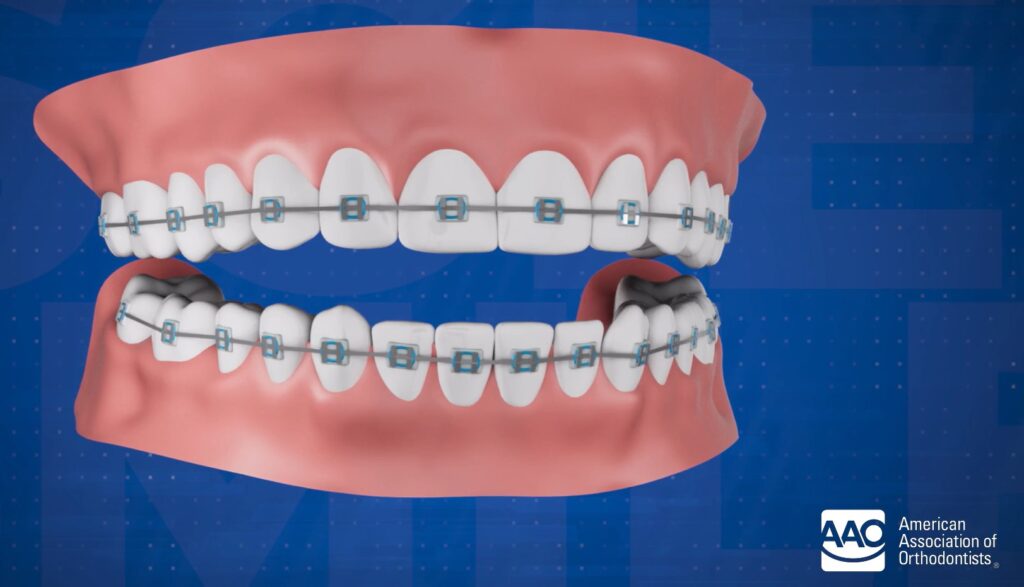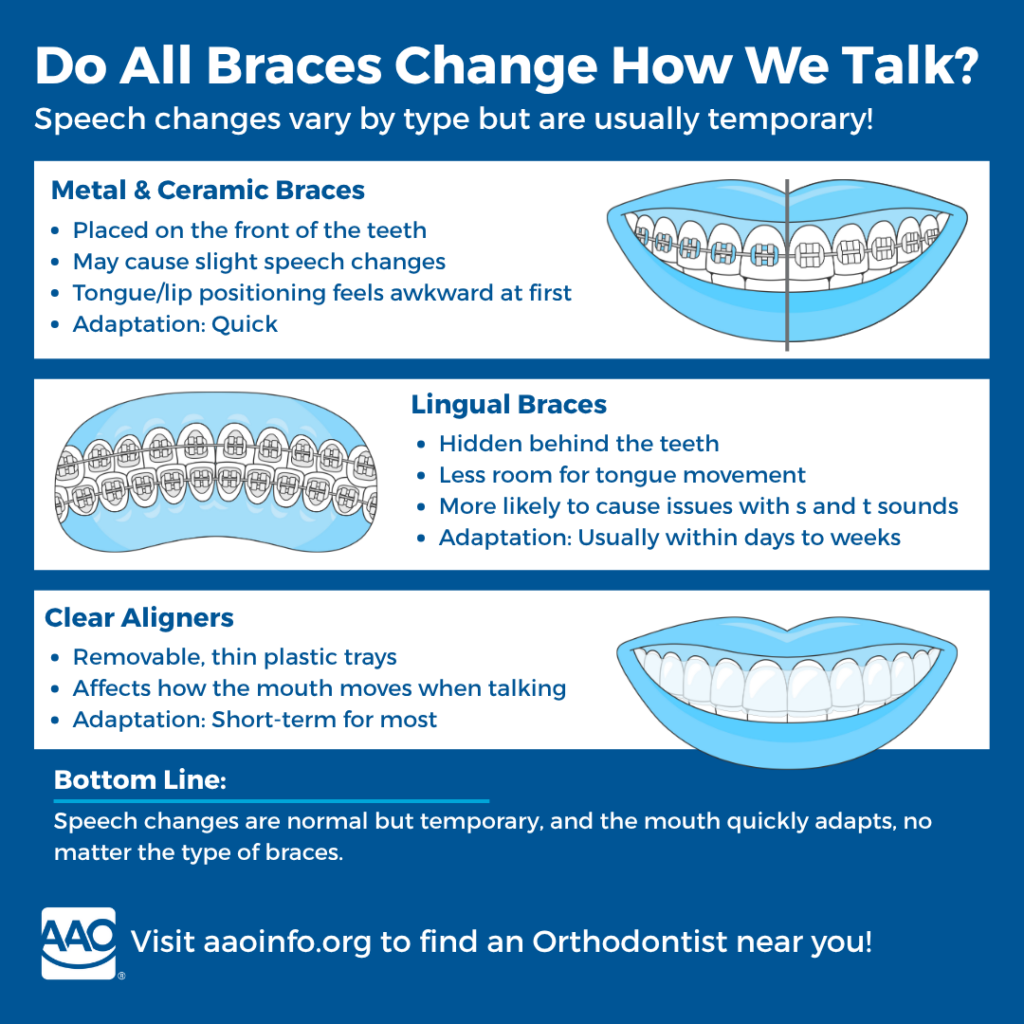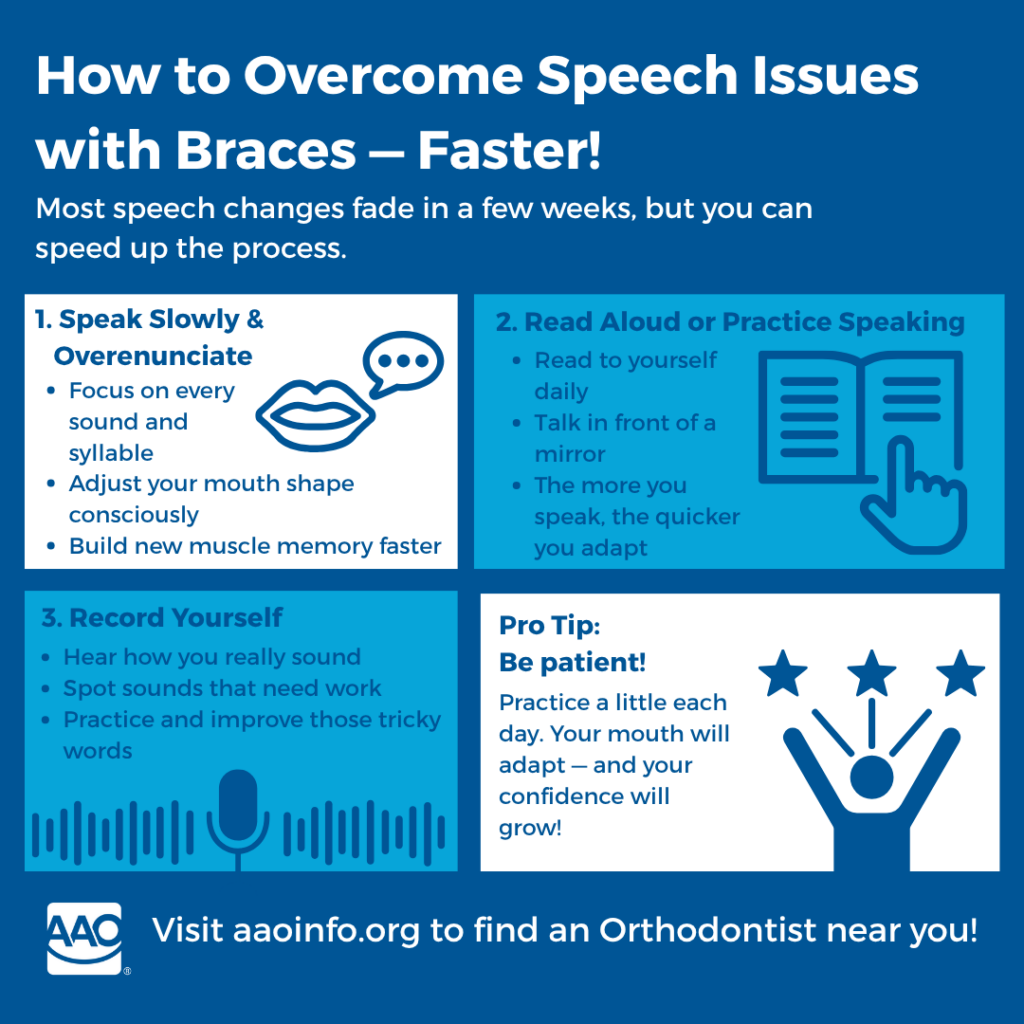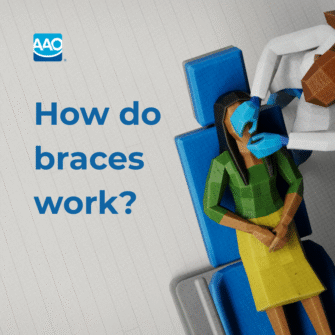The American Association of Orthodontists (AAO) doctors are often asked by patients if getting braces will change their speech. Patients are worried they’ll develop a speech impediment the moment the brackets are put on. After all, movies and TV shows have drilled into the American public for decades that characters with braces often look and talk in a funny way. It’s a trope Hollywood often relies on to create comic relief in their stories, and while it has a tiny grain of truth, like a lot of what you see in the movies, it’s completely overblown to the point of fabrication.
No, having braces does not mean you will have a lisp for the entire duration of your treatment. However, refusing to undergo treatment may result in speech impediments as your malocclusion worsens. In this guide, the expert orthodontists of AAO discuss how braces do and don’t impact speech, and tips you can use to train your mouth to get used to your new braces and how they fit in your mouth.
So I’m About to Get Braces. Will They Change My Speech?
The short answer is, maybe. Braces can temporarily change the way you speak. This is because you’re introducing an unfamiliar appliance into the limited space of your mouth. At first, your mouth and tongue aren’t going to know how to work normally with all the new brackets and wires. You may find yourself with a very slight lisp. If patients report difficulty, it’s usually with s and th sounds shortly after having braces attached. Some patients also report some difficulty with pronouncing d and t sounds, but this is less common.
However, this isn’t a given for every patient. A 2016 study reported that only 56% of patients who receive braces will experience some form of speech alteration. Even then, the severity of changes to speech was different among individuals. Some patients reported noticing only very slight differences that vanished almost immediately, while some had very pronounced lisps that lasted longer. Typically, the degree of speech alteration is linked to the severity of the malocclusion (problems with your bite and teeth not fitting together properly).
Either way, your mouth will begin to adapt to the more crowded condition, and your speech will return to normal eventually. Your tongue and lips, both essential for helping to form the sounds you make when you speak, will alter the way they move to accommodate your braces, and your speech will return to normal. So, to truly answer the question posed above, no. Braces will not negatively impact your speech in the long term.
Why Do Braces Temporarily Change How I Speak?

To understand this, it’s important to know how braces function. Braces are designed to exert pressure on your teeth and jaw to gradually move everything into the positions they’re supposed to be in to form a healthy bite. During the course of your treatment, your orthodontist will slowly alter the amount of pressure being applied to continue moving your teeth and jaws in the right direction. This is done by tightening archwires, adding elastics, and in some cases, utilizing additional appliances.
Eventually, your malocclusion will be corrected as your mouth is shaped to properly accommodate your teeth in a bite that fits together as it should. Your upper jaw (maxilla) and lower jaw (mandible) are also adjusted and reshaped as part of this process. Both jaws, your teeth, tongue, and lips are all used in shaping the sounds you use when you speak. Because the shape of your teeth and jaws are changed during treatment, it can cause temporary difficulties with speech as your body adapts to the new positioning of your mouth.
This does mean it’s also possible to experience a resurgence of slight difficulties with speech after a major adjustment to your braces during treatment. However, these are usually far less pronounced than after first getting braces, and tend to fade much faster.
Do All Braces Change How We Talk?

Just as patients may experience varying levels of temporary speech changes (or none at all) after getting braces, the type of braces used can also influence speech in different ways.
Classic metal and ceramic braces are both built similarly and function in the same way to adjust teeth. They both take up space in the mouth in the same way, too, meaning they also cause the same awkward positioning of the tongue and lips shortly after they’re put on. These types of braces are the most likely to cause slight changes in how you talk after getting them.
Lingual braces are a type of braces that are installed behind the teeth so you can’t see them from the front. Unfortunately, this leaves even less space in your mouth for your tongue, so there’s more potential for experiencing speech issues, especially with certain sounds like s and t. However, like metal and ceramic braces, patients usually adapt to the new appliances quickly and lose their lisp.
Clear aligners are specially designed “trays” that you place over your teeth to move them in the right direction. These are usually much thinner than other types of braces and can be removed. However, some patients report temporary speech problems with clear aligners, as they also change the shape of your mouth.
How to Overcome Speech Issues with Braces Faster
If you do experience changes in how you talk after getting braces, don’t panic. The changes usually don’t last more than a couple of weeks. After that, most people find they’ve adapted to the new shape of their mouth and can speak normally again. However, if you want to speed up that timeline, it is possible with additional training.
As the alterations to your speech are the result of your mouth’s muscle memory clashing with its new shape, you just need to develop new muscle memory to adapt. There are several effective strategies to achieve this.
Speak Slowly and Overenunciate

One thing we tend not to realize is just how much we rely on our learned habits when we speak. We may only lazily enunciate syllables or cut off full enunciation of those syllables altogether without realizing it because we’re still able to form the sounds we need in order to communicate fluently. However, our learned habits can interfere with the sounds we produce with lips, tongues, and jaws altered by the introduction of braces.
To overcome this, think actively about altering the shape of your mouth to form the correct sounds. Speak slowly so that you hear the different syllables, and try to over-enunciate each one. This forces you to be more conscious of the positioning of the parts of your mouth during different diphthongs and consonant sounds. Continuing to practice these positions will eventually form new habits when you speak, allowing you to adapt to braces sooner.
Read Aloud to Yourself or Practice Speaking
Practice makes perfect, as they say. Learning to talk with braces is no exception. Reading to yourself out loud, or practicing speaking in front of a mirror, are both great ways to practice talking with your new braces. The more you speak, the more your mouth will get used to the new way it feels. Eventually, you’ll adapt to the new sensations caused by getting braces, and your speech will improve.
Record Yourself Speaking
When speaking, most people don’t realize we have two voices: Our “head voice” and our true voice. When we speak, we “hear” our own voices mostly as vibrations as they’re conducted through the bone. This is our head voice, and it sounds different to us than what most people hear when they listen to us speak. As sound is conducted through bone, it resonates and sounds much deeper to us. However, other people hear our voice as vibrations through the air. To them, our voice sounds higher-pitched than it sounds to us. This is why people often say they hate the sound of their voice when it’s played back through a recording.
This same phenomenon can also lead us to gloss over certain speech difficulties without even realizing it. Recording yourself when you speak and then playing it back to yourself can help you identify words, sounds, and syllables you may be struggling with. Then, you can practice enunciating those sounds to develop new habits of saying them and adapting to your braces.
How Braces Prevent Speech Impediments
While it’s true braces may temporarily make it harder for you to talk, the major takeaway is that they actually make it easier to talk normally in the long run. As we’ve discussed, your speech is directly impacted by the shape of your mouth. Depending on the severity of your malocclusion, your crooked teeth can end up causing major speech impediments if left untreated.
Some common speech issues caused by misaligned teeth include /s/, /z/, /t/, /d/, /l/, /r/, and /oe/. Additionally, most lisps and whistling while speaking is caused by air passing through the mouth incorrectly. This is usually caused by gapped teeth and open bites. Slurred speech is generally caused by teeth crowding, as there isn’t enough room left in the mouth for the tongue and lips to align properly to form the correct sounds while speaking. Finally, underbites and crossbites can create trouble producing hard consonants like the /t/ and /d/ sounds.
The type and severity of the speech impediment depend on the type and extent of the malocclusion. The good news is that orthodontic treatment corrects malocclusions, reshaping the mouth and allowing patients to articulate sounds correctly when speaking. So while braces may make you talk funny for a few weeks when you get them put on, the benefits of being able to talk normally for the rest of your life far outweigh the slight temporary inconvenience.
Trust Your Mouth to the Experts of AAO
If you notice you’re talking a little differently after getting braces, the most important thing to do is to remain calm. No, you won’t sound like that forever. It truly is temporary. While it can take a few weeks, eventually your mouth will get used to your new braces and you’ll be chatting up a storm with hardly a thought about what you sounded like when you first got them put on. Not to mention that beautiful smile at the end of treatment will last a lifetime.
Now that you know you don’t need to be afraid of talking differently with braces, if you’re still looking for an orthodontic expert to put them on, look no further than AAO. We’ve created a network of tens of thousands of highly skilled, experienced orthodontists that spans the United States and Canada. We only allow the best of the best to join us, requiring our orthodontists to complete a minimum of a two-year residency in an accredited orthodontic program to be eligible for membership. So when you choose an AAO orthodontist, you can rest assured you will only get the highest quality care.
Use our AAO Orthodontist Locator tool to find an orthodontist near you, then book a consultation for orthodontic treatment today.



